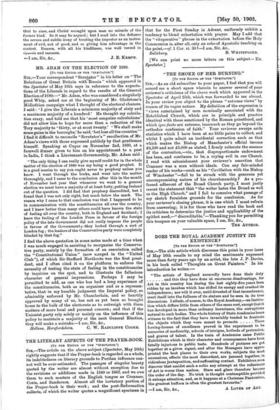" THE SMOKE OF HER BURNING."
[To THE EDITOR OF TEIE "SPECTATOR."] SIR,—As an old subscriber to your paper, I feel that you will accord me a short space wherein to answer several of your reviewer's criticisms of the above work which appeared in the Spectator of April 25th, which was forwarded to me abroad. In your review you object to the phrase " extreme views" by reason of its vague nature. My definition of the expression is "views entertained by men nominally associated with the Established Church, which are in principle and practice identical with those sanctioned by the Roman priesthood, and which ipso facto are extreme, inasmuch as they go beyond the orthodox confession of faith." Your reviewer sweeps aside statistics which I have been at no little pains to collect, and whilst I quite admit an incidental correction such as that which makes the Bishop of Manchester's official income £4,500 and not £5,000 as stated, I firmly reiterate the essence of the contention,—viz., that disproportionate endowment has been, and continues to be, a crying evil in our Church. I read with astonishment your reviewer's assertion that Cranmer was a man without ideals. Can any fair-minded reader of his works—such as his " Cavillation with the Bishop of Winchester "—fail to be struck with the generous yet uncompromising nature of his churchmanship ? As a pro- fessed adherent of the Broad Church party, I most justly resent the statement that " the writer hates the Broad as well as the High Church," and I fail to conceive what passage of my sketch furnishes grounds for the conclusion. As for your reviewer's closing phrase, it is one which I•must refrain from answering; it is for those who have read the book and its criticism to determine the justice and applicability of the epithet used,—" discreditable."—Thanking you for permitting this trespass on your valuable space, I am, Sir, &c.,
THE ADTHOE.






































 Previous page
Previous page